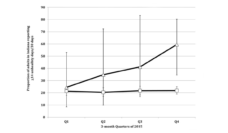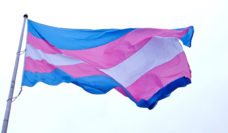Birth certificates are some of the most important identity documents available to residents of the United States because they establish a person as a “legitimate” presence in this country. Access to these documents, however, has never been an equal affair. Birth certificates in the U.S. were first conceptualized as documents allowing property-holders and land-owners to pass down assets. Eventually, they were formalized at the national level in 1902.
Since the 1900s, birth certificates have expanded in scope to include a variety of health and demographic data that are used to allocate over $300 billion yearly for government programs. These data are also used to create population estimates for national health surveys. Obtaining accurate birth certificates still remains a challenge, however, for marginalized communities, including but not limited to LGBTQ+ people.
Birth registration systems in some states have begun to include options for diverse family structures, but this is not the case nationally. LGBTQ+ people already face many barriers when building their families, including discriminatory adoption laws and unequal access to assisted reproductive technologies. Inaccurate birth certificates make it harder for LGBTQ+ parents to demonstrate their relationship to their children. They also force LGBTQ+ people to shoulder the extra burden of invisibility and erasure in existing health data systems.
This is a problem that affects a large and growing number of people in the United States: Family Equality Council reported in 2019 that more than 3 million LGBTQ+ people were planning to build their families in the coming years. In 2020, Gallup noted a continued rise in the percentage of adults in the United States who are LGBT, including nearly 16% of Generation Z adults.
Our research team works at the intersection of public policy and health equity. We recently completed a detailed analysis of birth registration policies across the U.S. to explore whether and how LGBTQ+ parents are included during the birth registration process. We examined birth registration policies in the 50 states, five inhabited territories, and the District of Columbia.
All policies, except for those in three states, assumed that the person giving birth to the child was a cisgender woman. Similarly, all policies, except for those in eight states and the District of Columbia, assumed that the person not giving birth to the child was a cisgender man. These policies rely on gendered, heteronormative assumptions about the sex and gender of a child’s parents. Specifically, they assume that the parents of a child are a cisgender woman who is giving birth and a cisgender man who is not giving birth. This arrangement does not reflect the realities of many LGBTQ+ people.
For example, a couple composed of a transgender man who is giving birth and a cisgender woman who is not giving birth would receive a completely inaccurate birth certificate for their child. Their family remains invisible in existing health data systems. There are many other examples of diverse family structures not represented by existing birth registration policies. This lack of representation is likely compounded for LGBTQ+ people who may hold multiple minority identities and already face many kinds of reproductive health inequities.
Birth registration policies in the U.S. often do not reflect the lived realities of many LGBTQ+ parents and families. One way to make these policies more accurate and inclusive is to separately collect information about each parent’s personal health and demographic characteristics (e.g., sex assigned at birth, gender) and their role in the birth itself (e.g., intended parental role, contribution to the pregnancy). These changes would be consistent with existing recommendations to remove assumptions about a person’s identities and biological characteristics in medical contexts. These changes would also allow birth certificates to acknowledge the medical advances that have led to the increasing use of assisted reproductive techniques among both LGBTQ+ and non-LGBTQ+ families.
A thoughtful and representative approach to birth registration in the U.S. will help to ensure equitable health care provision and access for LGBTQ+ people. Ultimately, making birth registration more accurate and inclusive will address existing health inequities that are disproportionately experienced by LGBTQ+ people.
We gratefully acknowledge our co-authors on the manuscript, Iman Berrahou and Elliott K. Main.
Photo via Getty Images















